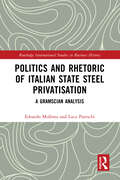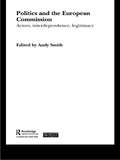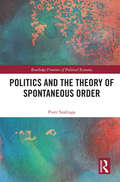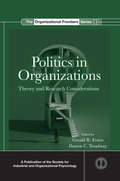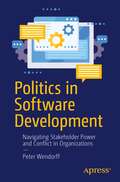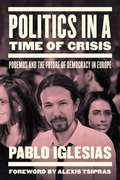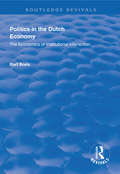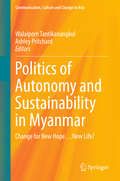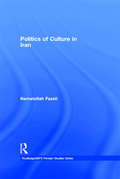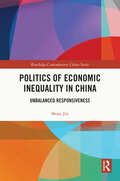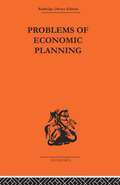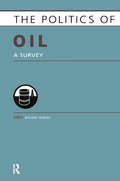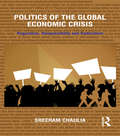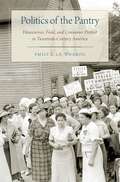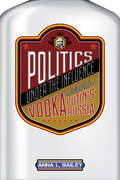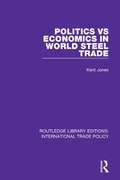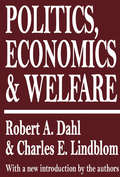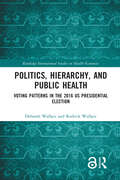- Table View
- List View
Politics and Power in the Multinational Corporation
by Christoph Dörrenbächer Mike GeppertThe current financial and economic crisis has negatively underlined the vital role of multinational companies (MNCs) in our daily lives. The breakdown and crisis of flagship MNCs, such as Enron, WorldCom, Lehman Brothers, Toyota and General Motors, does not merely reveal the problems of corporate malfeasance and market dysfunction. It also raises important questions, both for the public and the academic community, about the use and misuse of power by MNCs in the wider society, as well as the exercise of power by key actors within internationally operating firms. This book examines how issues of power and politics affect MNCs at three different levels; the macro-level, the meso-level and the micro-level. This wide-ranging analysis shows not only that power matters but also how and why it matters, pointing to the political interactions of key power holders and actors within the MNC, both managers and employees.
Politics and Prudential Supervision: ABN Amro's Bid for Antonveneta (A)
by Christopher M. Bruner Rawi AbdelalInvolves the March 2005 takeover bid launched by ABN Amro, the Dutch bank, for Padua-based Banca Antoniana Popolare Veneta S.p.A. (Antonveneta)--a bid that many would view as a test of Italy's commitment to the creation of a single European market for financial services, as well as the openness of the Italian retail banking market. Provides background on European financial integration and developments in the Italian banking market over recent decades, describes events surrounding ABM Amro's bid and the emergence of a competing bid by a much smaller Italian rival, and the role of the Bank of Italy in determining the fate of Antonveneta.
Politics and Prudential Supervision: ABN Amro's Bid for Antonveneta (B)
by Christopher M. Bruner Rawi AbdelalAn abstract is not available for this product.
Politics and Rhetoric of Italian State Steel Privatisation: A Gramscian Analysis (Routledge International Studies in Business History)
by Edoardo Mollona Luca PareschiThe globally spreading privatization wave that occurred in the 1990s deeply changed the structure of economic institutions worldwide. This turmoil overturned not only economic institutions, but shared cultural and societal institutions as well. This book is the result of an investigation into the history of the privatization of the steel industry in Italy, completed between 1994 and 1995. It explores the history of the Italian steel industry by looking at the interplay of local intertwined interests, political relations, and ideological formations that characterized an idiosyncratic hegemonic historical bloc. Rather than stigmatising this pattern as the legacy of a dysfunctional provincialism, the authors mobilise Gramsci’s theory of hegemony to explain how the Italian privatization process unfolded to accommodate economic pressures, political interests, and ideological constraints of a hegemonic social group, or aggregation of social groups. Thus, in reconstructing the privatization of Italian steel, this book proposes a hegemony theory of privatization and, more generally, describes a model that explains how political and cultural dynamics give rise to idiosyncratic local variations in globally spreading policies. It will be of interest to researchers, academics, and students in the fields of business history, economics, sociology and political science.
Politics and the European Commission: Actors, Interdependence, Legitimacy (Routledge/ECPR Studies in European Political Science #Vol. 36)
by Andy SmithThe European Commission is an organization which has come to fascinate or repulse a range of national politicians, journalists and social scientists. In contrast to the prevailing image of the Commission as a 'bureaucrat's paradise', however, and by using the results of original research, this book deliberately sets out to investigate this organization's relationship to politics. It does so first by developing a variety of case-studies (health, development aid, preparations for Eastern enlargement, etc.) as a means of studying the relationships, networks and interdependencies which link commissioners and Commission officials to national politicians, civil servants and interest groups. Second, by looking in detail at how the Commission publicizes its work, notably through producing public information and liaising with the media, fresh light is shone upon the complex question of the Commission's legitimacy. Politics and the European Commission provides a framework for generating new information about, and interpretations of, the power struggles at the heart of the EU.
Politics and the Theory of Spontaneous Order (Routledge Frontiers of Political Economy)
by Piotr SzafrugaThe theory of spontaneous order conceptualises and explains a number of institutional and social phenomena that are not an intended effect of either individual decisions or a collective consensus but an unplanned outcome of interactions between people pursuing their own aims. Drawing on these insights, this book demonstrates the utility of the theory of spontaneous order in explaining many phenomena in political economy and political science. The book opens with a discussion of the history and development of the theory of spontaneous order, particularly in economics and the Austrian School. The epistemological premises of the theory are then explored including the formulation of the central idea of social individualism. Demonstrating the potential applications of the theory of spontaneous order to politics, core ideas are examined including democracy, fragile states and the concept of the veil of ignorance. Finally, the limitations and constraints of the theory of spontaneous order are also reviewed and discussed. This book marks a valuable contribution to the literature on political economy, political science, public choice and political philosophy.
Politics in Organizations: Theory and Research Considerations (SIOP Organizational Frontiers Series)
by Gerald R. Ferris Darren C. TreadwayThis edited volume in the SIOP Frontiers series is one of the first to look at the psychological factors behind politics and power in organizations. Noted contributors from schools of management, psychology, sociology and political science look at the theory, research, methodology and ethical issues related to organizational politics and climates. The book is divided into three parts: Part 1 looks at the historical evolution of the field; Part 2 integrates organizational politics with important organizational behavior constructs and/or areas of inquiry, for example in the chapter by Lisa Leslie and Michele Gelfand which discusses the implications of cross-cultural politics on expatriates and within cross-national mergers; and Part 3 focuses on individual differences and organizational politics, focusing on the nature of political relationships.
Politics in Software Development: Navigating Stakeholder Power and Conflict in Organizations
by Peter WendorffEquip yourself to navigate organizational politics in the world of software development. This book will help you understand the power dynamics at work between competing stakeholders with conflicting goals in projects and organizations. Politics in Software Development consists of three main parts. Author Peter Wendorff begins by defining key concepts in organizational politics. He then moves on to software development processes and investigates how their design reflects stakeholder interests. In the final part, he highlights the role of political skill in software development and provides an overview of tactics that stakeholders frequently use. There is widespread competition within organizations for rewards, recognition, status, and power. It gives rise to political behavior of stakeholders, which is generally seen as a problem. This negative view of organizational politics tends to overlook its positive functions. For example, it can also be thought of as an arena where stakeholders with conflicting goals can argue, persuade, negotiate, bargain, and cooperate to address conflicts. Political conflict resolution regularly happens in organizations in an entirely civilized manner. It helps find agreements that reconcile differences in a constructive way, and it is needed because stakeholder conflicts are simply a natural aspect of organizations. While there is much literature about organizational politics, very few authors consider the specifics of software development. This book addresses both subjects and is written for an audience interested in a political perspective on software development. What You'll LearnRecognize and understand political activities in organizationsUnderstand what software processes have to do with stakeholder power and interestsAcquire fundamental political skills for dealing with politics in software development Who This Book Is For Project managers, lead developers, team leaders, team coaches, product owners, business analysts, developers, and other software professionals. This book is also suitable for students in software engineering.
Politics in a Time of Crisis
by Pablo IglesiasA manifesto for a new, democratic left: a political programme poised to transform EuropeSince 2011, Pablo Iglesias has led Podemos, a new radical left party in Spain that is reframing the nature of modern politics. Under his guidance, the party has unmasked the ideological motives behind European austerity, revealing the true nature of this power grab conducted on behalf of elites intent on dismantling the welfare state. Here, Iglesias delineates his political vision. He skewers not only the Spanish establishment, but also the anti-democratic bloc comprising the Troika, corporate interests, and the "Wall Street Party." Politics in a Time of Crisis--which includes an in-depth interview with Iglesias--is an incisive examination of the current situation in Europe as well as a stirring call for international resistance.From the Trade Paperback edition.e whose lives are affected. The Great Recession, he shows, was an excuse to dismantle the welfare state and bolster the power of the elites.From the Trade Paperback edition.
Politics in the Dutch Economy: The Economics of Institutional Interaction (Routledge Revivals)
by Bart SnelsFirst published in 1999, this volume surveys economic theories of political mechanisms as well as political theories of the influence of the institutional context in which decisions about social economic policies are being made. In the first half of the seventeenth century the Dutch Republic emerged as one of Europe's leading maritime powers. The political and military leadership of this small country was based on large-scale borrowing from an increasingly wealthy middle-class of merchants, manufacturers and regents This volume presents the first comprehensive account of the political economy of the Dutch republic from the sixteenth to the early nineteenth century. Building on earlier scholarship and extensive new evidence it tackles two main issues: the effect of political revolution on property rights and public finance, and the ability of the nation to renegotiate issues of taxation and government borrowing in changing political circumstances.
Politics of Autonomy and Sustainability in Myanmar
by Walaiporn Tantikanangkul Ashley PritchardThis book focuses on the tensions between and conflict resolution processes concerning minority ethnic groups in Myanmar's rural areas and the State. It covers topics such as relations and communication between the central government, the Kokang Chinese community and the Kachin State; the impact of cyclone Nargis on remote settlements in the Ayeyarwady Delta; the impact of depletion of mangrove forests and Yangon's fuel needs on a Karen minority group; and the collapse of a community forestry project in a Pa-O village in Shan State. Written by young scholars from Myanmar, some of whom belong to minority groups, the book provides firsthand reporting and scholarship that, for the past sixty years, have not been available. Offering in-depth, unique insights into minority change issues in the interior and at the periphery of Myanmar, as seen from local perspectives, it offers a valuable resource for academics, students and researchers in the fields of sustainable development, social and political studies, and development communication in Asia.
Politics of Culture in Iran (Routledge/BIPS Persian Studies Series)
by Nematollah FazeliThis first full-length study of the history of Iranian anthropology charts the formation and development of anthropology in Iran in the twentieth century. The text examines how and why anthropology and culture became part of wider socio-political discourses in Iran, and how they were appropriated, and rejected, by the pre- and post-revolutionary regimes. The author highlights the three main phases of Iranian anthropology, corresponding broadly to three periods in the social and political development of Iran: *the period of nationalism: lasting approximately from the constitutional revolution (1906-11) and the end of the Qajar dynasty until the end of Reza Shah’s reign (1941) *the period of Nativism: from the 1950s until the Islamic revolution (1979) *the post-revolutionary period. In addition, the book places Iranian anthropology in an international context by demonstrating how Western anthropological concepts, theories and methodologies affected epistemological and political discourses on Iranian anthropology.
Politics of Economic Inequality in China: Unbalanced Responsiveness (Routledge Contemporary China Series)
by Shuai JinThis book applies a novel theory of ‘unbalanced responsiveness’ to the issue of economic inequality in China to better understand the relationship between authoritarian regimes and their citizens. The book highlights how the Chinese Communist Party (CCP) has responded to dissatisfaction over inequality, with both propaganda and policy, revealing how the responsiveness in these two arenas is unbalanced. Arguing that whilst CCP propaganda claims to reduce inequality, its welfare programs have been stratified, unfair, and regressive, aggravating instead of alleviating inequalities. By utilising data from multiple national surveys, the book reveals that discrepancy between propaganda and policy ultimately generates further dissatisfaction and strong demands for redistribution. The findings of this study indicate how unmitigated and prolonged economic inequality could be a real threat to the sustained rule of the CCP regime. Providing a new theory, applicable to authoritarian and especially communist regimes, demonstrated through the lens of China, this book will be a valuable resource to students and scholars of Chinese studies, Political Science and Public Policy.
Politics of Economic Planning: Papers on Planning and Economics
by E.F.M. DurbinThe issue of planning prompted some of the fiercest debate in mid-twentieth century economics. Politics of Economic Planning collects together a number of papers from journals and contributed books that examine the problems of economic planning in a free society. They fall into three groups:Part 1 explains the idea of socialism and defines it in relation to democracy.Part 2 discusses problems of economic planning both in relation to political economy on the practice of planning and with the application of the theory of value to the conditions of a centrally directed economy.Part 3 examines the nature of economics.
Politics of Oil: A Survey
by Bülent GökayThis new title presents key information on the oil industry world-wide, and will be of interest to anyone involved in or studying the politics of oil production, processing and selling. Oil has long been at the forefront of political agendas, and with increased tensions in the Middle East, there has never been a greater need for up-to-date, reliable information on this key industry. Includes: * essays covering the main themes * an A-Z glossary listing important terms * detailed maps * a statistics section.
Politics of Public Money, Second Edition
by David A. GoodPublic money is one of the primary currencies of influence for politicians and public servants. It affects the standards by which they undertake the nation's business and impacts the standard of living of the nation's citizens. David A. Good's The Politics of Public Money examines the extent to which the Canadian federal budgetary process is shifting from one based on a bilateral relationship between departmental spenders and central guardians to one based on a more complex, multilateral relationship involving a variety of players.This new edition offers an up-to-date account of the Canadian system, including the creation of the Parliamentary Budget Officer, the government's response to the global financial crisis, Canada's Economic Action Plan, strategic and operating reviews, the most recent attempts to reform the Estimates, and much more.An insightful and incisive study of the changing budgetary process, The Politics of Public Money examines the promises and pitfalls of budgetary reform and sheds new light on the role insiders play in influencing government spending.
Politics of a Guaranteed Income: The Nixon Administration and the Family Assistance Plan
by Daniel P. MoynihanA prominent Democrat discusses The Nixon Administration and the Family Assistance Plan.
Politics of the Global Economic Crisis: Regulation, Responsibility and Radicalism
by Sreeram ChauliaA crucial commentary on the worst global economic crisis since the Great Depression, this book argues for ‘Three Rs’ — Regulation, Responsibility and Radicalism — i.e., state regulation of finance, state responsibility towards society, and radical social movements to fight for economic justice. It will interest scholars and researchers in international political economy, politics, international relations, and economics, as also policymakers and the informed general reader.
Politics of the Pantry: Housewives, Food, and Consumer Protest in Twentieth-century America
by Emily E. LB. TwarogThe history of women's political involvement has focused heavily on electoral politics, but throughout the twentieth century women engaged in grassroots activism when they found it increasingly challenging to feed their families and balance their household ledgers. Politics of the Pantryexamines how working- and middle-class American housewives used their identity as housewives to protest the high cost of food. In doing so, housewives' relationships with the state evolved over the course of the century. Shifting the focus away from the workplace as a site of protest, Emily E. LB. Twarog looks to the homefront as a starting point for protest in the public sphere. With a focus on food consumption rather than production, Twarog looks closely at the ways food - specifically meat - was used by women as a political tool. Engaging in domestic politics, housewives both challenged and embraced the social and economic order as they sought to craft a unique politicalvoice and build a consumer movement focused on the home. The book examines key moments when women used consumer actions to embrace their socially ascribed roles as housewives to demand economic stability for their families and communities. These include the Depression-era meat boycott of 1935, the consumer coalitions of the New Deal, and the wave ofconsumer protests between 1966 and 1973. Twarog introduces numerous labor and consumer activists and their organizations in both urban and suburban areas - Detroit, greater Chicago, Long Island, and Los Angeles.
Politics under the Influence: Vodka and Public Policy in Putin's Russia
by Anna L. Bailey"You know just how serious a problem alcoholism has become for our country. Frankly speaking, it has taken on the proportions of a national disaster." So spoke Russian President Dmitry Medvedev in 2009 as the government launched its latest anti-alcohol campaign. Challenging the standard narrative of top-down implementation of policy, Anna Bailey’s Politics under the Influence breaks new ground in the analysis of Russian alcoholism and the politics of the Putin regime.The state is supposed to make policy in the national interest, to preserve the nation’s health against the ravages inflicted by widespread alcohol abuse. In fact, Bailey shows, the Russian state is deeply divided, and policy is commonly a result of the competitive interactions of stakeholders with vested interests. Politics under the Influence turns a spotlight on the powerful vodka industry whose ties to Putin’s political elite have grown in influence since 2009. She details how that lobby has used the anti-alcohol campaign as a way to reduce the competitiveness of its main rival—the multinational beer industry. Drawing on a wide range of sources including fieldwork interviews, government documents, media articles, and opinion polls, Bailey reveals the many ambivalences, informal practices, and paradoxes in contemporary Russian politics. Politics under the Influence exhibits the kleptocratic nature of the Putin regime; as a result, analysis of vested interests and informal sources of power is essential to understanding public policy in contemporary Russia. This book will be an invaluable resource for anyone working on policy and corruption in Putin’s Russia.
Politics vs Economics in World Steel Trade (Routledge Library Editions: International Trade Policy #20)
by Kent JonesThere can be few industries which have generated as much political controversy as the world steel industry. Since 1968 the trade policies of both the US and the EEC have created a vicious circle of protectionism and delayed adjustment in their steel industries. In particular, protectionist policies by one government have tended to lead directly to rebound protectionist policies by the other. This book, first published in 1986, begins by tracing the historical roots of steel protectionism and describes the changing competitive structure of the world steel market which has led to increased government involvement in the traditional steel-making countries as they became vulnerable to imports from the newly industrialised countries. The most distinctive feature of the book is its economic analysis of a policy crisis; a crisis whose inner dynamics work against a viable solution.
Politics, Economics, and Welfare
by Robert A. DahlFor most of this century, the habit of thinking about politics and economics in terms of grand and simple alternatives has exerted a powerful influence over the minds of those concerned with economic organization. Politics, Economics, and Welfare is a systematic attack on the idea of all-embracing ideological solutions to complex economic problems.
Politics, Finance and the Role of Economics: An Essay on the Control of Public Enterprise (Routledge Library Editions: Public Enterprise and Privatization)
by C. D. FosterOriginally published in 1971, when nationalized industries employed about 7 per cent of the national labour force, created about 10 per cent of the gross domestic product and had annual investment programmes which were equal to those of all private manufacturing put together. Even this understates the scope of public enterprise at the time, since there were many other organizations, ranging from the BBC to the Public Trustee, which were semi-autonomous public enterprises, but not nationalized industries. Moreover, the public enterprise sector continued to grow, even under Conservative governments, and there were many reasons for thinking that no government would succeed in reversing this trend, for it was felt unlikely that, as government became more complex, it would disgorge many new activities which would be given a semi-autonomous, that is, public enterprise status. The author, drawing on personal experience, shows that the facts of ministerial and parliamentary control were very different from what the public and Parliament thought at the time. He describes the very great practical independence of the Boards and also how much Ministers had come to rely on persuasion (which not only can impose serious waste of time and money on both Boards and Government but is also inefficient). Ministers have least power where the aims of public enterprise are social rather than commercial. If there were no changes, the growth of public enterprise to achieve social purposes would mean an important decline in the power of Parliament and Ministers. This book explores solutions to this problem and concludes that the government must build up a cadre and capacity for financial control which at the time were lacking to it.
Politics, Hierarchy, and Public Health: Voting Patterns in the 2016 US Presidential Election (Routledge International Studies in Health Economics)
by Rodrick Wallace Deborah WallaceSteep socioeconomic hierarchy in post-industrial Western society threatens public health because of the physiological consequences of material and psychosocial insecurities and deprivations. Following on from their previous books, the authors continue their exploration of the geography of early mortality from age-related chronic conditions, of risk behaviors and their health outcomes, and of infant and child mortality, all due to rigid hierarchy. They divide the 50 states into those that gave their electoral college votes to Trump and those that gave theirs to Clinton in the 2016 presidential election and compare the two sets for socioeconomic and public health profiles. They deliberately apply only simple standard statistical methods in the public health analyses: t-test, Mann-Whitney test, bivariate regression, and backward stepwise multivariate regression. The book assumes familiarity with basic statistics. The authors argue that the unequal power relations that result in eroding public health in the nation and, in particular, in the Trump-voting states, largely cascade from the collapse of American industry, and they analyze the Cold War roots of that collapse. In two largely independent chapters on economics, they explore both the suppression of countervailing forces, such as organized labor, and the diversion of technical resources to the military as essential foundations to the population-level suffering that expressed itself in the 2016 presidential election. This interdisciplinary book has several primary audiences: creators of public policies, such as legislators and governmental staff, public health professionals and social epidemiologists, economists, labor union professionals, civil rights advocates, political scientists, historians, and students of these disciplines from public health through the social sciences.
Politics, Identity, and Mexico’s Indigenous Rights Movements
by Todd A. EisenstadtDrawing on an original survey of more than 5,000 respondents, this book argues that, contrary to claims by the 1994 Zapatista insurgency, indigenous and non-indigenous respondents in southern Mexico have been united by socioeconomic conditions and land tenure institutions as well as by ethnic identity. It concludes that - contrary to many analyses of Chiapas's 1994 indigenous rebellion - external influences can trump ideology in framing social movements. Rural Chiapas's prevalent communitarian attitudes resulted partly from external land tenure institutions, rather than from indigenous identities alone. The book further points to recent indigenous rights movements in neighboring Oaxaca, Mexico, as examples of bottom-up multicultural institutions that might be emulated in Mexico and elsewhere in Latin America.


